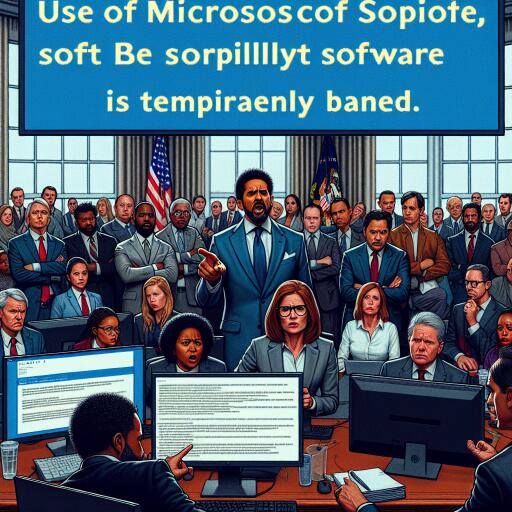Microsoft Copilot Faces Ban Within the US House of Representatives
In a move that underscores growing concerns over data security within governmental bodies, the US House of Representatives has initiated a temporary prohibition against the deployment of Microsoft’s innovative Copilot generative AI assistant by its personnel. This decision reflects heightened scrutiny on the security protocols of cutting-edge technologies being integrated into governmental operations.
The recent directive, originating from the office of the Chief Administrative Officer of the US House, Catherine Szpindor, explicitly mandates the cessation and removal of all Copilot functionalities from devices operated by the chamber’s staff. This decision has been influenced by evaluations from the Office of Cybersecurity, highlighting the potential risks associated with the unintended dissemination of sensitive House data through channels not sanctioned by the House itself.
Addressing the core of the reservations, the guidance pinpoints concerns about the contemporary commercial variant of Copilot, spotlighting the apprehensions about the secure management of data within non-approved cloud environments. Such apprehensions resonate with broader debates surrounding the security implications of leveraging cloud-based AI technologies within environments demanding high confidentiality levels.
In response to these security critiques and in anticipation of adapting to stringent government data protection standards, Microsoft has signaled its intent to unveil a governmental version of the Copilot AI assistant. This iteration is designed to align with the elevated security and compliance requirements characteristic of federal operations, with a targeted release frame set for the summer of 2024. Through adapting its technology to meet these specific needs, Microsoft aspires to bridge the gap between innovative AI functionalities and governmental cybersecurity standards.
As the narrative unfolds, the Chief Administrative Officer’s office has adopted a watchful approach, indicating that a thorough evaluation of Microsoft’s forthcoming government-geared Copilot variant will determine its suitability for integration into the US House’s operational frameworks. This cautious stance underlines the legislative body’s commitment to balancing the potential efficiencies offered by AI technologies with the imperative to safeguard sensitive governmental data.
Moreover, amidst these developments, Microsoft continues to enhance the Copilot ecosystem for its broader base of users, spotlighting upcoming features tailored for business and educational clientele. Noteworthy among these is a forthcoming update poised to harness content generated within applications such as Word, Outlook, Excel, and PowerPoint. This enhancement aims to refine Copilot’s responsiveness to technical inquiries, further enriching the user experience. Scheduled for deployment in April 2024, this update represents a pivotal element in Microsoft’s strategy to integrate AI seamlessly into workplace productivity tools.
In summary, the US House of Representatives’ measure to temporarily sideline Microsoft Copilot underscores a prudent approach towards embracing AI technologies within government operations. As technological advancements continue to press against the boundaries of traditional data security protocols, the ongoing dialogue between innovation and privacy remains a critical focal point for institutions at the forefront of governance.










